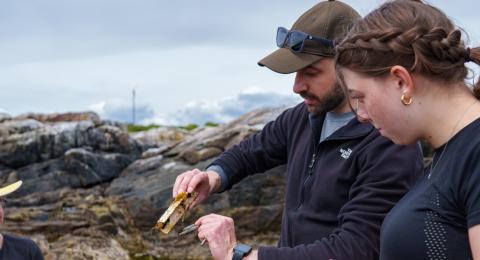If you have further questions about getting a degree in Marine Biology (Ph.D.), please contact Easton White at mb.coordinator@unh.edu.
Why pursue a Ph.D. in marine biology at UNH?
Our marine biology Ph.D. program will help you advance your career as you seek to understand and protect marine and estuarine ecosystems and the organisms that inhabit them. Faculty in our program use marine organisms as model systems for molecular phylogeny, cellular metabolism and neurobiology, and study the structure and function of marine ecosystems. You’ll have the opportunity to focus on basic research or work in more applied areas such as aquaculture and fisheries. Our graduates now lead agencies involved in managing valuable marine resources, teach marine biology in academic and public settings, own aquaculture companies, and work in research.
Program highlights
Our location, faculty and laboratories makes UNH one of the best institutions from which to obtain a graduate degree in marine biology. Our faculty have expertise ranging from molecular biology to ecology and fisheries, and their research programs often span disciplines and use a variety of methods and technologies to address marine-related questions and issues. The main UNH campus in Durham is located about five miles from the Great Bay Estuary, home of the UNH Jackson Estuarine Laboratory, and 30 miles from the coastline and the UNH Coastal Marine Laboratory. Each of these laboratories supports a number of research vessels used by faculty, staff and students. Students can become certified research divers through our strong dive program. Finally, there are several state-of-the-art research resources on campus, including a DNA sequencing facility, an aquaculture laboratory, and various microscope and instrumentation centers.
Potential career areas
- Academia
- Aquaculture
- Aquarium industry
- Environmental consulting
- Environmental protection and resource management
- Fisheries management and research
- Habitat restoration
- Marine/environmental outreach
- Marine policy
- Nonprofit organizations
- Research
- Research diving
Curriculum & Requirements
The Marine Biology (MB) option is intended for students interested in marine, coastal, and estuarine ecosystems, and the organisms that inhabit them, at all levels of inquiry. Some UNH faculty use marine organisms as model systems for molecular phylogeny, cellular metabolism, and neurobiology, while others study the structure and function of marine ecosystems. Some faculty members focus primarily on basic research; others work in more applied areas such as aquaculture and fisheries; many combine the two. Students who have earned advanced degrees at UNH lead agencies involved in managing valuable marine resources, teach marine biology in academic and public settings, own aquaculture companies, or earn a living as researchers. In addition to on-campus facilities, UNH owns the Coastal Marine Laboratory and the Jackson Estuarine Laboratory, and a range of research vessels. UNH has an excellent SCUBA diving program for students interested in becoming certified to dive as part of their research. The Marine Biology option is also affiliated with UNH’s School of Marine Sciences and Ocean Engineering.
Ph.D. Degree Requirements
Students work with their advisor and their Doctoral Guidance Committee to plan a program of study including the required core courses and competencies, and develop a viable research proposal. The Guidance Committee is normally established by the end of the first semester, and should meet by the end of the second semester. The student presents to the Guidance Committee a preliminary research proposal in which the soundness, originality, and feasibility of the planned research are clearly described. The Guidance Committee is responsible for approving the proposal, and also oversees the qualifying examination through which the student is admitted to doctoral candidacy. The Doctoral Dissertation Committee is established at this point. To earn the Ph.D. degree, students must complete an original dissertation project, present the results at a public seminar, pass an oral dissertation defense consisting of questions from members of the Dissertation Committee, and have the dissertation approved by the Dissertation Committee and accepted by the Graduate School.
Number of Credits Required
There is no specific credit requirement for the Ph.D., though students must take required core courses and meet competency requirements.
Up to 8 credits of graduate credit from another institution may be transferred, provided the credits were not counted toward another degree, and the course grade was a B or higher. Petitions requesting transfer credit must be supported by the advisor and graduate committee, and approved by the UNH Graduate School.
Required Courses, Competencies, and Electives
All students in the Marine Biology Graduate Program are required to take:
1. BIOL 901 Introductory Graduate Seminar: first-semester course focuses on key information and skills for a successful transition into the graduate program, familiarizing students with program requirements and faculty and providing an opportunity to meet others in their cohort.
2. Two courses in contemporary techniques: Students must take two courses in this competency category, with one course needing to be quantitative. Students should consult their advisor or the graduate program coordinator to determine the courses that fulfill this category.
3. One course in writing/communication: This may be fulfilled by previous graduate coursework (as determined by the student’s advisor and committee), or by taking one graduate-level course. Recommendations often include coursework in professional writing and communication: BIOL 902 Writing and Publishing Science is taught fall semester, and open to students at any stage of the program. BIOL 950 Scientific Communication is usually taught in spring.
4. One marine-based course: This may be fulfilled by previous graduate coursework (as determined by the student’s advisor and committee), or by taking one graduate-level course that has a marine focus.
5. Field requirement: This requirement may be fulfilled by either taking a graduate-level course that has a significant field component as part of the course, or by conducting field research in support of the student's thesis research.
6. Ph.D. students will be required to be a Teaching Assistant for one semester, or demonstrate prior teaching experience.
Additional Information/Requirements
All students in the Marine Biology Graduate Program are expected to present their research in public seminars (including the UNH Graduate Research Conference), and acquire teaching and/or mentoring experience.
Program Learning Outcomes
Core Knowledge
- Demonstrate expert knowledge of the subdiscipline relevant to their research project and general knowledge of the broader discipline of marine biology.
Critical Thinking
- Critique, evaluate, and integrate qualitative and quantitative biological research and methods to develop original hypotheses.
Research
- Synthesize research methods and data analysis techniques to conduct an independent and original research project that contributes new knowledge to address a gap in the field.
Communication
- Ability to effectively communicate scientific information, concepts, theories, and methods to professional colleagues (specialists), invested parties, and the general public.
Professionalism
- Conduct research ethically and responsibly and intellectually engage with the broader scientific community.
Deadlines
Applications must be completed by the following deadlines in order to be reviewed for admission:
- Fall: January 15 (priority*); August 1 (final) *Applications completed by Jan. 15 will be given priority consideration for admission and financial support. Applications completed after Jan. 15 will be considered based on openings and funding.
- Spring: N/A
- Summer: N/A
- Special: N/A
Application fee: $65; Underrepresented U.S. minority applicants to this program may be eligible for an application fee waiver. Please contact Dr. Dovev Levine (dovev.levine@unh.edu) for more details
Campus: Durham
New England Regional: No
New England Regional: VT
Accelerated Masters Eligible: No
New Hampshire Residents
Students claiming in-state residency must also submit a Proof of Residence Form. This form is not required to complete your application, but you will need to submit it after you are offered admission, or you will not be able to register for classes.
Transcripts
If you attended UNH or Granite State College (GSC) after September 1, 1991, and have indicated so on your online application, we will retrieve your transcript internally; this includes UNH-Durham, UNH-Manchester, UNH Non-Degree work and GSC.
If you did not attend UNH, or attended prior to September 1, 1991, then you must upload a copy (PDF) of your transcript in the application form. International transcripts must be translated into English.
If admitted, you must then request an official transcript be sent directly to our office from the Registrar's Office of each college/university attended. We accept transcripts both electronically and in hard copy:
- Electronic Transcripts: Please have your institution send the transcript directly to grad.school@unh.edu. Please note that we can only accept copies sent directly from the institution.
- Paper Transcripts: Please send hard copies of transcripts to: UNH Graduate School, Thompson Hall- 105 Main Street, Durham, NH 03824. You may request transcripts be sent to us directly from the institution or you may send them yourself as long as they remain sealed in the original university envelope.
Transcripts from all previous post-secondary institutions must be submitted and applicants must disclose any previous academic or disciplinary sanctions that resulted in their temporary or permanent separation from a previous post-secondary institution. If it is found that previous academic or disciplinary separations were not disclosed, applicants may face denial and admitted students may face dismissal from their academic program.
Letters of recommendation: 3 required
Recommendation letters submitted by relatives or friends, as well as letters older than one year, will not be accepted.
Personal Statement/Essay Questions
Prepare a brief but careful statement regarding:
- Reasons you wish to do graduate work in this field, including your immediate and long-range objectives.
- Your specific research or professional interest and experiences in this field.
Important Notes
All applicants are encouraged to contact programs directly to discuss program-specific application questions.
Applicants are strongly encouraged to apply early if they wish to be considered for financial and priority consideration.
GRE Not Required:
The GRE (general or topical) is NOT REQUIRED for admission by any of the programs in the Department of Biological Sciences.
International Applicants
Prospective international students are required to submit TOEFL, IELTS, or equivalent examination scores. English Language Exams may be waived if English is your first language. If you wish to request a waiver, then please visit our Test Scores webpage for more information.
Inquire with the Department about Research Interests
As part of your application process, we recommend touching base with the academic department or specific faculty about your research interests, fit with the department, and available space. You can Submit an Extended Inquiry and we will inform your desired academic program about your interest. By submitting an inquiry form, you are not guaranteed to hear back from specific faculty. This can be a helpful step before going through the full application process.
Explore Program Details
If you are interested in a MS or PhD program within UNH’s Department of Biological Sciences (options of Integrative and Organismal Biology or Marine Biology), it is important to contact potential thesis mentors (professors) before applying to our program. You can find a directory of relevant mentors in the “FACULTY DIRECTORY.” It is never too early to contact potential thesis mentors, but we suggest contacting them between August and October of the year before you expect to start your degree (for example, contact a mentor in September 2020 if interested in applying by January 2021 for full consideration to begin as a graduate student in Fall 2021). However, you should never be afraid to reach out to a prospective mentor as graduate opportunities can open throughout the year.
How do you contact potential advisors? After identifying professors whose interest align with yours, send them an email to introduce yourself and your interests. This email should contain the following:
- A brief introduction of who you are and your current status
- Your interests broadly
- Why you are interested in this professor’s work and how it aligns with your own interests
- Attachments of CV or resume, and unofficial transcripts
Still intimidated? Use the text below labeled “Email Template” to help you contact a professor.
Can I contact more than one professor in the Department of Biological Sciences or at UNH? Absolutely! Graduate positions are very competitive, and often a professor can only take on one or two students each year (if any). Thus, it’s important to contact as many professors as possible, provided that their research aligns with your interests. You can let professors know who else you are contacting within the department or university when you contact them (see template below).
What if I don’t get a response? Try again! Professors are very busy, and can receive hundreds of emails a day. Sometimes this results in slow reply times, or simply emails getting missed or lost. Wait at least a week, and then try to send again. If after three tries you still do not get a response, this likely means the professor is not taking on any graduate students in the near future.
Other general tips and advice for applying to graduate school: Take time to think about why you want to go to graduate school and conduct research (and communicate this clearly when reaching out to prospective mentors). Before contacting prospective mentors, take some time to learn about their research (either via webpages, their publications, or other resources). Get help from advisors, your university career centers, and others for updating your resume or CV, ensuring that you highlight any research or scientific experiences, important courses taken, skills, and awards received.
Email Template
If you are potentially interested in working with one or more professors towards a MS or PhD in Biological Sciences at the University of New Hampshire, you can use this template email to introduce yourself to these potential advisors.
Please note that you should contact each professor individually (it’s okay to contact more than one faculty member in our department!); individualize your responses to each professor, particularly paragraphs #2 and #3). Also know that this is simply a template; prospective students do not need to follow these instructions exactly when reaching out to prospective mentors. We just hope this helps you get started and give you confidence in contacting faculty!
Dear Dr. [insert professor’s full name here]:
Paragraph 1: Introduce yourself! State your name, educational status and history (including GPA and major and/or degree. If you have graduated, include when you graduated and your current position.), and what semester and year you are aiming to start your graduate studies.
Paragraph 2: Discuss your relevant qualifications and experience that make you an ideal candidate for our graduate program. This may include specific skills you have, research experiences, internships, publications or presentations, and relevant coursework.
Paragraph 3: Describe your specific interests within the field of Biological Sciences? How do these interests align with this professor’s work? What about this professor’s work excites you? Be specific when possible, demonstrating your own efforts to understand this professor’s research.
Thank you for your time in reading this email and your consideration. I have attached my [resume/CV; make sure to attach!] and unofficial transcripts [attach]. I would enjoy an opportunity to chat with you further about potential opportunities as a graduate student in your research group.
Sincerely,
[Insert your full name here]
























